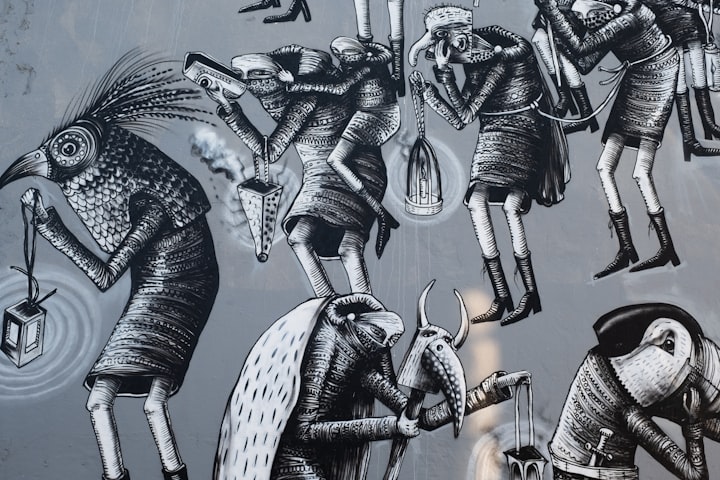Top 5 Mistakes When Writing Characters
Carful planning = less mistakes

With the COVID-19 virus wreaking havoc on the economy, jobs, and healthcare, perhaps, with some new found time on your hands, you are ready to write that heart-pounding adventure that has been lingering on the tip of you quill for months. You snatch your parchment, gather your notes, and prepare to dive into the creation of a brand new world. However, before you take that final step and throw your characters into the provocative world from your imagination, be wary of the top five mistakes that amateur writers make that will cause audiences to re-shelf your manuscript. Avoid these disastrous mistakes and get ready for a magical adventure through your own mind.
1. Creating the "shallow" character
So, this often occurs when young writers jump the gun on crafting their worlds without any thought of possible character arcs or personalities. The shallow character comes as a product of centering the story around the character rather than seeing the him/her as an active component of the story. Your characters are the initial hook that draw audiences in, enticing them to continue reading. Look around you right now. Life is complex and so should your character. He/she should possess unique talents, weaknesses, interests, lexicons, and particular mannerisms. These don't always have to be identifiable in a single explanation with a description, rather, the depth of the character should unravel naturally through the plot as he or she encounters a variety of complex situations and scenarios. With a shallow character, the readers may care more about the world than whether the protagonist lives or dies. Focus on the depth of the character to provide sympathy and understanding that bridges the world of fantasy.
2. Making characters too "perfect"
The Golden Rule of writing is to keep characters relatable, thus, drawing the audience into the story. But many times, we writers can fall victim to the "superman" way of thinking where our heroins are practically invincible. In our attempts to craft a world so unlike ours, we can sometimes over exemplify perfection in our characters. The goal of a story is to strike an equilibrium between feeling similar to and different from the new environment presented through your book. Yes, it's okay for your heroes to have weakness, to fail, to loose their tempers, and even to die. When we enter a world, we want readers to perceive an immediate risk to the protagonist, but if a character is too perfect, this leads the audience to shrug and discount the danger by say, "Eh, they'll be fine," or ,"they always manage to make it out." We want people to connect with out characters, and apart of that is embracing the blemishes evident in human nature.
3. Giving characters overly complicated backstories
While a character must be complex, overly complicated backstories are usually difficult to write concisely and weigh down the characters if not executed carefully. Remember, you are taking the audience on a journey by allowing them to experience the present story; an arduously perplexing story of something in the past can sometimes draw away from the actual point of the present. If it does not genuinely build character arc or does not enhance the present story line, then cut it. This way, readers can focus on one thing at a time. Also, comment below how many popular characters you can think of that have had their parents killed! I think this backstory in particularly has been used so much it's like kicking a dead horse.
4. Adding unnecessary characters
I have most definitely fallen victim to this choice, even going so far as to completely erase characters out of one of my books when I realized my critical mistake. Perhaps, you have too. Adding unnecessary characters can be both a blessing and a curse, depending on how you write them in. There are always going to be those side characters that are relatively flat, encompassing a few main attributes, that pop up every once in a while to present information. For instance, Lavender and Patel in Harry Potter, they are characters that are mentioned, providing little blurbs of information when needed or just to reinforce the feelings. Like when the Professor sees the grim in Harry's tea petals and Lavender gasps or acts differently around him. Those characters are fine because they reinforce what the author is presenting through the narrative. However, some characters can weigh down a story and you might feel like bringing them in more will help advance other character arcs, but if they are unnecessary, and don't contribute to the story, bring more complication to the story, then don't bother putting them in. Also, if you are tired of a character, your writing for them will most likely be sub par. The rule here is: cut the fat.
5. The unpredictable character
This character style comes in more during the writing process as you find ways to portray them. The unpredictable one is one that is written with so that the audience never knows how he/she is going to do something, speak, move, or act. Now this is not to say that your character should not be unpredictable, rather, if your character is unpredictable that is his predictability. Keep your characters actions and behaviors consistent, so when they break that pattern it provides some emphasis. It's like the way you would not see Hermione say something unintelligent or use slang or Ron do something that would betray his friends. These are the characters' attribute foundations, and should not be broken unless there is a great need or twist. To avoid the unpredictable character, know how your character thinks, sounds, feels, and behaves before writing them.
Comment down below if you have ever made one of these mistakes :)





Comments
There are no comments for this story
Be the first to respond and start the conversation.